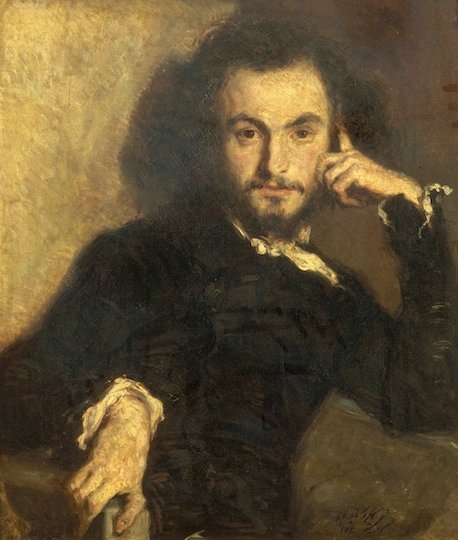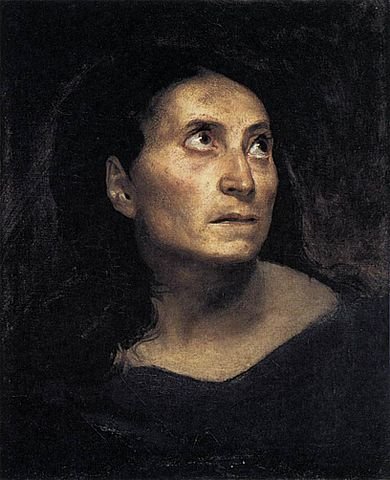
Charles Baudelaire: foundational writer of modern lyrics (part I)
Dear readers, so far we have travelled a significant distance in this walk through the beginnings of poetic modernity, which we undertook a few months ago and which we hope to continue in our contribution to the knowledge of the foundations of modern Western poetry to the present day.
But before we go on, let us remember (or need) a premise. There are two senses to consider modern poetry: one broad and one restricted. According to the first, modern poetry would begin with Romanticism and spread throughout the twentieth century. According to the second criterion, it would begin with Symbolism, a current inaugurated by Charles Baudelaire, and would obviously continue until the 20th century.
On our way we have visited great milestones: German, English and French Romanticism, Edgar Allan Poe, Walt Whitman... We now reach precisely that milestone which is the poet, thinker, critic, essayist and translator Charles Baudelaire.
While our purpose in these posts is to communicate essential theoretical aspects of the literary work and the contributions of these authors to the development of modern poetry, it is necessary to review parts of their biography. If you are interested in further information you can consult the following link.

Charles Baudelaire was born in Paris in 1821, and died in the same city in 1867. His father was an educator, painter and civil servant of the State, of Catholic formation; from him surely came the interest towards the art and the religious influence of the poet. His mother trained him in English. It is said that he was raised by the servant of the family.
When Baudelaire was five years old, his father died, from whom he received an important economic inheritance. After a short time, his mother married a soldier, who rose to important positions. The boy and young man Baudelaire always had an antipathetic relationship with his stepfather, who placed him in a rigid disciplinary school, from where he would be expelled for his rebellion against the impositions.
As a young man he had a libertine and bohemian life, of diverse "disorders" in the amorous and sexual (he attended brothels and maintained public relations with well-known prostitutes), drug consumption, etc. He took part in Parisian literary and artistic circles and befriended Nerval, Balzac and Gautier, among other important writers of the time. He carried out works of art criticism, which were published posthumously under the title Aesthetic Curiosities; these works focused on contemporary painters who received his impulse, such as Delacroix. He also devoted himself to literary criticism, works collected in the posthumous book The Romantic Art.
His most outstanding book of poetry is Las Flores del Mal (The Flowers of Evil), published in 1857, which was censored and its author subjected to judicial process for "offending public morals and good customs". However, the book was published again in an enlarged edition in 1861. Special mention should be made of his book Pequeños poemas en prosa (also known as El spleen de París), from 1869, of great relevance to modern poetry. It should be remembered that he was the first French translator of much of Edgar Allan Poe's work. In addition, he is the author of The Artificial Paradises, a study of Richard Wagner's musical work, and the essay The Painter of Modern Life, of great significance for his aesthetic ideas. Also of interest are his posthumous intimate diaries, which contain his important text "My heart in the nude".
His death occurred as a result of the complications caused by the syphilis he had been suffering from for several years.

We will now deal with the aspects that seem to us to be most relevant to his work and contributions.
Baudelaire had nourished himself with the best Romanticism, distancing himself from any sentimental affectation, inclination to easy spontaneity and negligence in writing. He participated in Parnasianism, with which he identified himself in ideas such as the contempt for utilitarian art and the valuation of stylistic rigour and the function of music in the poem. However, it transcends both movements and becomes a precursor of Symbolism (see), framed in the current of Decadentism (see, of which it is also an expression. This is what leads Balakian to say: "Historically he is a maladjusted; he arrived too late and too early.
One must recognize that Baudelaire is aware of the extraordinary complexity of the human soul. This leads him to investigate dark regions of the spirit, but a certain affective ambivalence is formed, always from his critical position and intellectual discipline.
- Baudelaire is the introducer of the word modernity*("modernité", in French) in the cultural discussion. In his essay *The Painter of Modern Life*, an interpretation of the work of Constantin Guys, he appears for the first time:
He seeks that something that we will be allowed to call modernity, since we cannot
find a better word to express the idea in question. [...] Modernity is the transitory, the fugitive, the contingent, half of art, the other half of which is the eternal and the immutable [...] In short, for every modernity to be worthy of becoming antiquity, it is necessary that the mysterious beauty that human life involuntarily inserts into it can be extracted.

- Here is a primordial contribution of this writer: in his concept of modernity we find the conjunction of what characterizes the present as such -its particularity, which is fleeting-, but which, for that very reason, becomes transcendent. As Compagnon puts it: "Modernity seeks the recognition of the double nature of the beautiful, that is, also, of the double nature of the human being".
Thus, in his aesthetic thought, Baudelaire bequeathed to us: the concept of the Beautiful, which is influenced by Poe. It is conceived not as a quality, but as an effect. Beauty will be given by particular elements; it is not absolute nor one, but singular and plural and therefore "the beautiful is strange". Hence, modernity
"is that element that, in particularizing it, vivifies beauty." (Peace)
- And from there, to the concept of poetry in Baudelaire:
First of all, Baudelaire conceives that in the word there is something sacred, and that using it supposes an "evocative enchantment", as we can read in his essay on Gautier in Romantic art. Evocation will perhaps be one of the ways par excellence of fulfilling the aesthetic effect of the poem. But what is evocation for Baudelaire? Language, beyond its ordinary instrumental use, can produce another dimension, in which associations not previously determined (sensations, images, meanings) are aroused.

So for Baudelaire poetry would be understood as a spiritual experience circumscribed to earthly nature. In other words, a projection of the inner vision on the outer world, with a correspondence between the two, giving rise to what we know as "synesthesia". This can be assumed as a resource based on the association between sensory stimuli of different types, which produce a confluent effect in the mind (we will deal with this specifically in poems by Baudelaire in the following post).
Sorry, but the importance of Baudelaire merits another post. We read in the next one. Thank you for your attention.
Bibliographic references
Balakian, Anna (1969) The Symbolist Movement. Spain: Eidt. Guadarrama
Compagnom, Antoine (190). The five paradoxes of modernity. Venezuela: Monte Ávila.
Todó, Lluís (1987). Symbolism. Spain: Edit. Montesinos
Paz, Octavio (1985). *The sons of the limo^. Colombia: Edit. The Black Sheep.
Written by @josemalavem
Click on the coin to join our Discord Chat

Witness proposal is here:
Go To Steem Witness Page
In the bottom of the page type: adsactly-witness and press vote.

Use small letters and no "@" sign. Or, click here to vote directly!
Thank you!
Baudelaire, one of the cursed poets and father of modern poetry. The Flowers of Evil is one of the most important works of universal literature and modern poetry. One of the poems I like the most from Baudelaire is unquestionably El Albastro. In it the poet is compared to the albatross which flies over the world, accompanying the journey of humanity but from the height, an ideal that is impossible for men to reach. Certain and beautiful that last stanza:
Thank you for always sharing these excellent works on the great writers and movements that have had life in universal literature, @josemalavem.
Grateful for your excellent comment, @nancybriti. "The Albatross" is one of the main poems of that line that Baudelaire had in reflecting on poetic creation and the poet. By the way, in some of the notes on his biography, it is said that he wrote it on that boat trip in which his stepfather embarked him towards India, when he was very young and that he did not finish. Greetings.
I loved his works when I was a dark young lady but I appreciate also now.
Posted using Partiko Android
Thank you for your reading, @noemilunastorta. Baudelaire will always be valid.
Sir @adsactly at first i want to give you great and big thank..Sir i really greatful to see this post .. sir you have good tallent .. you know how we love or what we need to know ..when i reed it I am out sence i beleive i talking with Charles Baudelaire . .he is alive again in my heart only for you ... again thank you sir .😍😘@kingrefat
Thank you for your affectionate comment, @Kingrefat. Indeed, Baudelaire is a writer who deserves our attention if we are interested in poetry and literature in general.
Baudelaire is the definition of a rebellious artist. Like a moth attracted to fire. His life might be short-lived but his contribution to literature is not. What a great article. Honestly, I'm not a fan of his but this article stroke my curiosity.
Thank you for your reading, @yuki-nee. Certainly. Baudelaire was a rebel and at the same time a solid thinker and artist. I think it is the authors who are indispensable in our reading and sensitive training.
Hi, @adsactly!
You just got a 0.33% upvote from SteemPlus!
To get higher upvotes, earn more SteemPlus Points (SPP). On your Steemit wallet, check your SPP balance and click on "How to earn SPP?" to find out all the ways to earn.
If you're not using SteemPlus yet, please check our last posts in here to see the many ways in which SteemPlus can improve your Steem experience on Steemit and Busy.
Charles Baudelaire is one of the greatest poets and of the mind, more geniuses and suspics that the world has had. His dark and somber personality took him to the most decadent scenes of the Parisian world at that time, which was an incredible way to write. Thanks for the post
When Danny Morrison and the 22-star strikes in the Ticker box, if the de-Villiers on the edge of the Gard, t
Posted using Partiko Android